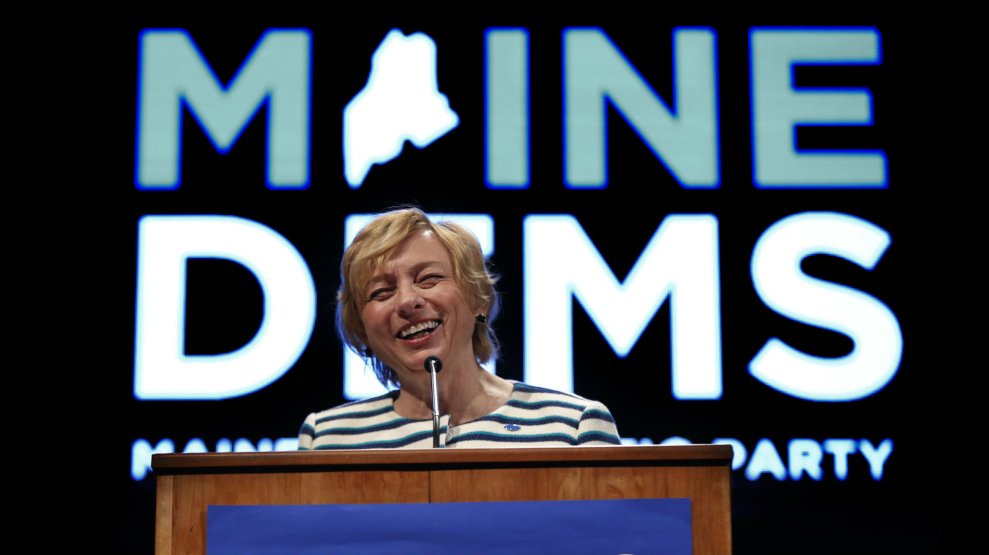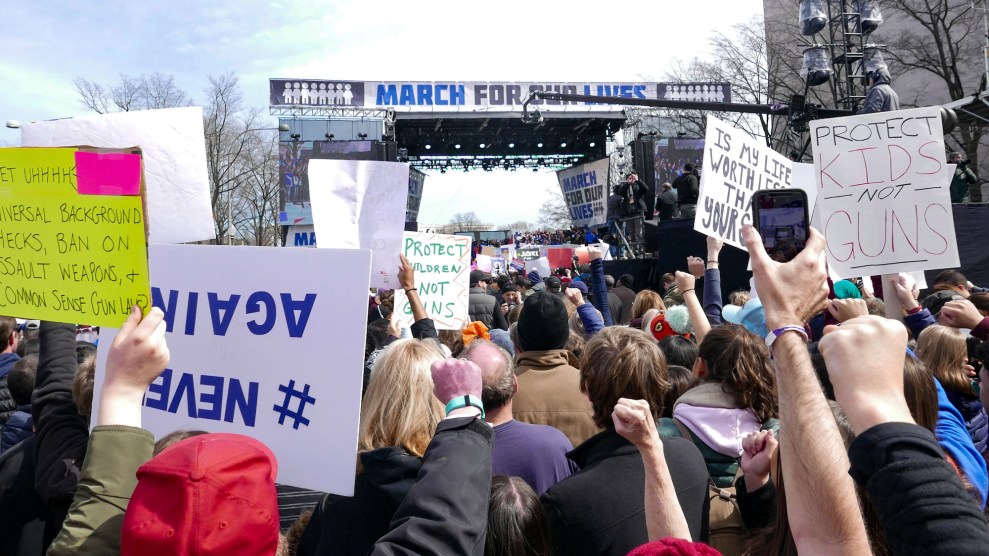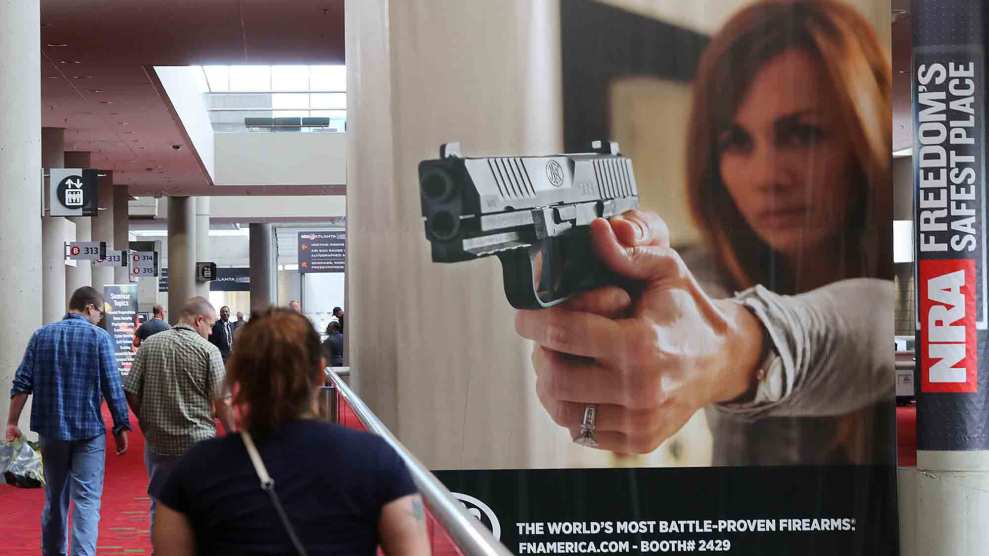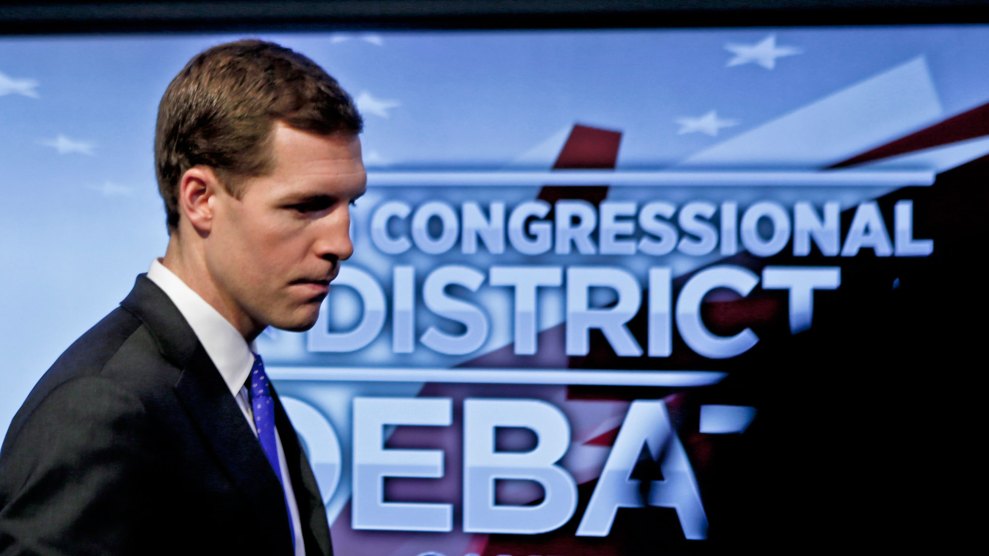
Janet Mills speaks at the Maine Democratic convention last month.Robert F. Bukaty/AP
When Maine Democrats gathered last month for their state convention, most of the party’s gubernatorial hopefuls wanted to talk about gun control. Progressive activist Betsy Sweet outlined her specific plan of action, telling the crowd gathered at an ice rink in the city of Lewiston that she’d work to ban assault weapons and enforce universal background checks. Attorney and National Guard veteran Adam Cote leaned on his experience as an Army officer to assure the crowd that he “would be a leader on this issue from day one.” Former Maine House Speaker Mark Eves reminded listeners that he’d already taken on the National Rifle Association. And state Attorney General Janet Mills, the apparent frontrunner, noted that her fellow Democrats have “a lot of work to do…for the student so afraid that any day might bring the next shooting.”
It’s a remarkable shift in rhetoric for a place like Maine—a state with a robust rural population and hunting tradition—where guns have long been a touchy subject. When Cote ran for Congress 10 years ago, for example, he portrayed himself as an ardent defender of the Second Amendment. But in the wake of the February school shooting in Parkland, Florida, Democrats across the country have taken a tougher stance on the issue. The Mainers running for governor are no different: Each of the Democrats supports some combination of “common sense” gun control measures, such as banning assault weapons or expanding background checks.
Last week, the National Rifle Association responded to the Maine Democrats’ positions on firearms by awarding “F” ratings to all seven of them. Notably, that includes Mills, who has taken heat from fellow Democrats in the run-up to Tuesday’s primary for what they say is her past coziness with the gun lobby.
As a candidate for governor, Mills’ gun control positions are similar to those of her Democratic competitors. She has called for a slew of firearms restrictions, including bans on assault weapons and high-capacity magazines, and touts her efforts to keep guns out of the hands as domestic abusers, who account for roughly half of the homicides in the state. But as a state legislator representing a rural district a decade ago, Mills received “A” or “A+” ratings from the NRA for her voting record during each of her three terms. In March, Eves criticized Mills for that record in a Portland Press Herald op-ed, asking readers to take note of how the candidates “diverge on guns.” In an ad released earlier this month, Cote invoked the NRA’s past praise of Mills. “As a veteran, gun owner, hunter, and father, I believe there are common sense things we can do to keep our kids safe,” he says to the camera. “Janet hasn’t led on gun safety. As governor, I will.”
The dynamics at play in Maine’s Democratic primary are similar to other crowded Democratic races across the country. Insurgent candidates have latched onto gun control as a wedge issue, touting their endorsements from gun safety organizations while criticizing long-serving frontrunners like Mills, for whom a positive NRA rating—or even a somewhat softer stance on the issue—was once seen as an advantage. It’s a strategy that aims to channel the “Parkland Effect” energy into the 2018 midterms, an effort to galvanize the progressive base that many hope will boost Democrats in the November general elections.
There are at least some indications this strategy could work in one of this year’s toss-up governor’s races: Last year, voters in Virginia, another purple state with a hunting-inclined population, elected a Democratic governor with an aggressive gun control platform. But Mainers tend to have a strong distaste for national influence in local politics and have often viewed the gun debate as just that. It all adds up to a difficult balancing act for Democrats, who know that winning their first statewide election in 12 years will require both progressive urban and suburban voters for whom gun control is an important issue, as well as rural voters who feel demonized by the national gun conversation.
Maine has a long and largely celebrated tradition of gun ownership. It’s hard to locate precise estimates of who in the state owns firearms—a 2015 study found that only about a quarter of Mainers have guns, but a 2016 local news poll reported that more than 55 percent of them do. Regardless, hunting and sport shooting remain popular pastimes, especially in state’s rural northern and western regions. Maine’s constitution affirms gun ownership as a way of life: In 1987, residents voted to drop the “for the common defense” provision from the state’s version of the Second Amendment, which now simply reads, “Every citizen has a right to keep and bear arms and this right shall never be questioned.” As its New England neighbors have been tightening gun restrictions, Maine has done the opposite. In 2015, it became one of a handful of states that does not require a permit for a resident to carry a concealed weapon.
But there have been signs of a shift. A poll conducted in the wake of the 2012 school shooting in Newtown, Connecticut, found that nearly four-fifths of Mainers support at least some restrictions on gun ownership. Later that year, the state legislature passed a bipartisan bill that would have required background checks for every gun sale, but Gov. Paul LePage—an outspoken conservative Republican—vetoed it. Under current federal law, background checks are only required to be performed by licensed firearms dealers, not by private individuals who often sell weapons at gun shows. In 2016, Mainers narrowly rejected a ballot measure that would have eliminated this so-called “gun show loophole.”
“The [2016] vote was disappointing, but we knew we’d built a movement,” says Bill Harwood, a Portland-based attorney who has been active in statewide gun control efforts since the 1990s. “We got a lot more momentum, a lot more volunteers.”
This year, in the wake of the Parkland massacre, state legislators abruptly stopped worked on a bill that would have allowed people picking up or dropping off students at schools to have unloaded guns in their cars. The following month, Democratic state Sen. Mark Dion—who is also running for governor—introduced a “red flag” bill that would enable law enforcement officials to take firearms away from individuals who appear to pose a risk to themselves or others. Six Republicans co-sponsored the bill, though it did not receive a vote before the end of the legislative session.
Democrats running in Maine have tried to capitalize on what they see as growing momentum for gun control in the state. Sweet has leaned on her status as the only Democrat who qualified for Clean Elections funding—a state program for candidates who forgo special interest and high-dollar contributions—to remind voters that she isn’t beholden to gun manufacturers or the NRA. Cote’s ads, some of which depict school lockdown drills, promise that he’ll work to increase state mental health resources and ban high-capacity magazines and bumpstocks, the device used in last year’s Las Vegas massacre to make guns fire more rapidly.
But much of the Democratic gun rhetoric has been directed toward Mills’ time in the legislature. Her opponents point out that Mills voted against a bill to close the gun show loophole and another that would have given public colleges and universities authority to regulate the possession of firearms on their campuses. Four Democrats in the race have received recognition as “Gun Sense Candidates” from the gun control group Moms Demand Action, but Mills isn’t one of them.
Mills’ 2018 campaign platform backs the same gun regulations as her fellow Democrats: In addition to calling for a ban on military-style assault weapons, bumpstocks, and high-capacity magazines, she’s supported the creation of a red flag law, something she worked on with Dion. Mills has said she received good grades from sportsmen’s groups because she “supported open access to public lands” and faithfully represented a “rural Maine community” with “a strong hunting tradition.” She points out that despite the favorable NRA ratings, she never took any campaign funding from that group.
What’s more, Mills isn’t the only Democrat to have moved to the left on guns in recent years. During his run for Congress 10 years ago, Cote, who had never held publicly-elected office, positioned himself as the more moderate Democratic candidate on guns, according to a 2008 Press Herald story:
A question about gun control elicited disagreement among the Democratic candidates.
[Michael] Brennan and [Ethan] Strimling both said they will stand up to the National Rifle Association to fight for stronger guncontrol [sic] laws.
[Chellie] Pingree and [Steve] Meister both said they favor a ban on assault weapons but also support people’s right to hunt.
Cote and [Mark] Lawrence, meanwhile, both described themselves as strong supporters of the Second Amendment, which guarantees the right to bear arms.
Even so, Mills’ NRA ratings have set her up for stinging criticism. During one debate in April, Eves contrasted his own “D” rating from the group with Mills’ record. But the harshest attacks have come from Cote. Their feuding came to a head in the final primary debate, when Mills was asked about her relationship with the NRA. Mills told a personal story of her own experience with domestic abuse, when an alcoholic partner had held a gun to her head in a drunken rage. Reminding viewers of her work on domestic violence and gun control, she said, “You can spend another million dollars on attack ads attacking me, but don’t ever say I don’t care about gun safety.” Cote and Mills then sparred on the reason for those “A” ratings, and Mills repeated, as she had several times, her justifications for those votes. “My record is being distorted once again,” she said.
But for all of the bitterness of the primary, it’s still an open question whether Mainers in November will vote for the candidate who takes the toughest stance on guns. Just hours before the gubernatorial candidates gave their stump speeches at the state Democratic convention, the delegates overwhelmingly rejected a proposal to include an assault weapons ban in the party platform. That vote followed impassioned remarks from former Democratic state Sen. John Patrick, who lost his seat to a GOP hardliner in 2016. Recalling the objections to gun control efforts voiced by voters in his rural district, he warned convention attendees that adopting that position would “un-elect Democrats.”
Recent history suggests he had a point, and that hunting- and gun-related measures have the power to energize conservative voters in a way that could spell trouble for Democrats. In both 2014, when Mainers voted on whether to restrict some bear hunting practices, and 2016, when they voted on background checks, Democrats lost in rural districts. “It’s always hard to prove causation in these things,” says Emily Cain, the executive director of EMILY’s List, who lost her runs for Maine’s rural Second Congressional District in 2014 and 2016. She says that her supporters in those races came from both sides of the issue, but that the hunting and gun lobby tried hard to use the measures against her. “The opposition knows people are inclined to think Democrats won’t support” gun rights, she says.
There’s also a general distaste for national issues, something that played out during the 2016 ballot measure. The NRA spent $1.17 million to defeat the measure, but national gun control organizations, such as former New York City Mayor Michael Bloomberg’s Everytown for Gun Safety, spent more than five times that much in support of the unsuccessful proposal. The massive outside spending galvanized grassroots opposition from those who took as much umbrage to perceptions of outsider meddling as they did to the limitations the ballot measure threatened to impose. “Mainers are real, real feisty about other people telling us what to do, especially rich people from other places telling us what to do,” explains Jim Melcher, a professor of political science at the University of Maine Farmington.
That reality gives pause to some political experts, who are watching Democrats renew their push for gun legislation. “I’d be careful with gun control in the primary, and I’d stay away from it as far as I could in the general,” says Mark Brewer, a professor of political science at the University of Maine at Orono, located in the 2nd district. “What we’re seeing is candidates taking a national issue with national energy and trying to jam it into a local context. There is some activism, especially among younger people, but guns aren’t a top-of-the-conversation political issue.”
But gun control advocates like Harwood counter that Democrats have little to lose by putting the issue front and center. “I argue over and over again for Democrats to be smart about the politics,” Harwood says. “The NRA is not going to help you—it’s going to do everything it can to defeat Democrats. On the other hand, if you can tap into the Democratic base here, and those people who are sick and tired of seeing kids getting shot in schools. You can find a lot of support.”
















